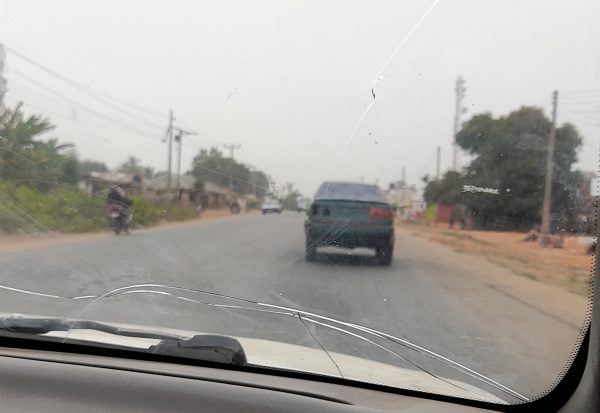How Customs, Immigration, Others Aid Smuggling At Idiroko Border

By Kenneth Jukpor
Recently, our correspondent visited the Idiroko Border community to observe firsthand the modus-operandi of smuggling and other illicit activities in the area as well as the unique role of security operatives.
Idiroko is a town in Ipokia local government of Ogun State, Nigeria. It is situated along the Nigeria-Benin border and has been an official border crossing point since at least the 1960s.
Due to the location of an official cross-border post and as a result of cross-border trading activities within the frontier town, Idiroko has grown from a village to become a town. The residents of Idiroko are multilingual because of their mixed culture due to cross-cultural contact and intermarriages.
An illegal smuggling trade exists within the settlement. Illegal cross-border trade is carried out by settlers and transient populations using knowledge of the local population to create alternative routes within the border. Among the goods smuggled are petrol, poultry, tyres, motor parts, drugs, cars and electronics. There exist at least six illegal entry points in the area.
Our correspondent counted 21 checkpoints of security officials between Owode and the Idiroko border, including the Nigeria Customs Service (NCS), Nigeria Police Force (NPF), Nigerian Immigration Service (NIS), Nigerian Army and Vehicle Inspection Officers (VIO).
While these numerous roadblocks have been identified as major violators of the Economic Community of West African States (ECOWAS) protocol on free trade and movement within the Nigeria–Benin transport corridor, the level of smuggling activities and sharp practices in this 30 minutes journey beggars belief.
At every checkpoint and roadblock on the Idiroko route, security officials demand between N200 to N1,000 each as an entitlement from the driver, with claims that the driver should know his obligation to them, MMS Plus observed.
Immigration
The Idiroko frontier post is also used by human traffickers to carry young girls and boys from the Republic of Benin into Nigeria. Sometimes, the underage children are leased by their parents to work in Lagos for a stipulated time frame. Most of the children are taken from Benin to serve as maid or house-help in Nigerian households.
In a bid to curb this menace, the Immigration Service’s role at the border region becomes sacrosanct. However, our correspondent observed that NIS officials at the Idiroko border environs are only concerned about settlements.
After stopping a commercial vehicle which had six passengers including our correspondent at Aiyetoro, a team of Immigration officers asked three passengers to alight, having observed that they aren’t residents of the area.
Following a tortuous interview of one’s state of origin, place of birth and reason for heading to Idiroko, our correspondent was cleared to return to the vehicle, but two other women; Ifeoma from Anambra State and Oluchi from Imo State had to plead for more than 10 minutes after failing to convince the NIS officials that there weren’t heading to transact cross-border business at Idiroko.
The security agents later collected N500 each from two women who confided to MMS Plus that they were heading to the border to buy items including rice and used clothings, to be resold in Nigerian markets.
While the pleading and negotiations in the above scenario was taking place, another NIS official was receiving N1000 from a team of three young Nigerian boys also heading to Idiroko. The boys were initially billed N5,000 before the heavy discount to N1,000 after they provided valid identity cards such as driver’s licenses and international passports.
Customs
While NCS has the onus of curbing smuggling and other sharp practices in the area, our investigation showed that NCS are losing the battle or fanning the flames of smuggling in the region.
At several Customs checkpoints, the questions by the officers were – wetin you carry (referring to smuggled items)? You carry rice? Wetin dey your bonnet and boot?
These questions were usually answered with frank answers like – “na just tin tomatoes”, “oga nothing dey, check for yourself”, but those with smuggled items stretched out N500 or N1000 at the checkpoints before being subjected to questioning. The difference in settlement is based on the smuggled item conveyed and price already charged by the drivers.
Can one deduce from these questions that Customs in the region actually expect traders to convey contrabands as their focus was the settlement? As our correspondent pondered these thoughts, a discussion with a commercial driver would later put things in perspective.
The driver said smuggling rice and other products via the Idiroko border was easier than the Seme Border, if one settles Customs earlier and uses the right vehicles. Nevertheless, another passenger and border trader in the bus argued that the reverse was the case.
Motorcyclists also play a great role in smuggling rice in smaller quantities as they speed past Customs officials, taking heavy wood strikes as they refuse to stop for examination.
Some traders were also seen buying over 50 litres of premium motor spirit (PMS) from filling stations in the Nigeria border area for the Benin market at two times the price in Nigeria. The fuel was measured in large polytene bags and rapped with clothing by the traders.
Police/ VIO
While at other border areas such as seaports and airports there is a fierce battle for supremacy and jurisdiction over seizures, arrests and investigation, the Idiroko border area displays a charming symphony of security agents as several checkpoints would have Police, Customs, VIO, and NIS doing their jobs seamlessly.
A strange incident that caught the attention of our correspondent was the high rate of unregistered vehicles popularly known as “fayawo” going by Nigerian Police and VIO without interruption.
It seems convenient, most of the time, to overtly express disapproval of smuggling just as people denounce other societal evils. What has not equally gained the same level of expediency is the effort to nip the act in the bud.
Why would Police and VIO allow these vehicles, as shown in the photo above, move through the area without seizing them?
Police in the area would gladly collect their N200 per vehicle toll from these drivers and they speedily signal NIS and Customs when the drivers refuse to pay and they spot non-indigenes or perceive there are smuggled items in the vehicles.
The Verdict
Idiroko can be described as a place where smuggling thrives whilst there is also a booming security business that could be labeled Joint-Border Security Business.
The Idiroko-Sango-Ota and Ado-Odo-Atan roads are notorious for smugglers’ activities because they are the major roads they ply while bringing their smuggled items from Cotonou, Benin Republic’s main commercial nerve-centre, into Nigeria.
It behooves the leadership of the various security operatives to address this menace which may require a complete redeployment of those in the border axis and leadership and attitudinal training for new officers.
An outburst by a senior Customs official at Idiroko observed by our correspondent showed that the Customs border leadership may not be abreast of sharp practices in the region.
Speaking over the phone, the NCS officer lamented that the Idiroko Area Controller, Comptroller Peter Kolo had demanded a letter from the NCS headquarters before a seized smuggled vehicle would be released.
Another problem for the Idiroko Customs Command is that most Customs extortion outfits had vans indicating Federal Operations Unit (FOU), which is another arm of the Service.
MMS Plus also observed that all the officers involved in bribery on the border axis wore vests that wouldn’t display their nametags. Most officials involved wore polos or khaki tops without nametags and those with nametags stayed aloof, allowing the unidentifiable officers to do the extortion.
Recall that earlier this month, a journalist and publisher of Media Hotline Platform, Theophilus Oyekanmi was a victim of assault by officers of Customs Service at the Idiroko border area.
This beating occurred because he tried to snap some smuggled vehicles at Atan.
“The officer in Nojeem’s base attacked me, destroying my clothes, belt and my android phone. It took the intervention of other officers who saved me after not less than five blows (2 to my eyes) and 3 head booths,” the reporter lamented.
Smuggling has become a problem posed limiting the Nigerian economy and this problem led to the closure of the land borders for over a year. The land borders have been reopened, but the challenge remains.
Perhaps, we could take a cue from the former President of the Importers Association of Nigeria (IMAN), Mr. Okeze Okereke, who argued that some officials of the national task force on the importation of contraband, small arms and illegal goods had to be relieved of their duties because of their connivance with smugglers.








